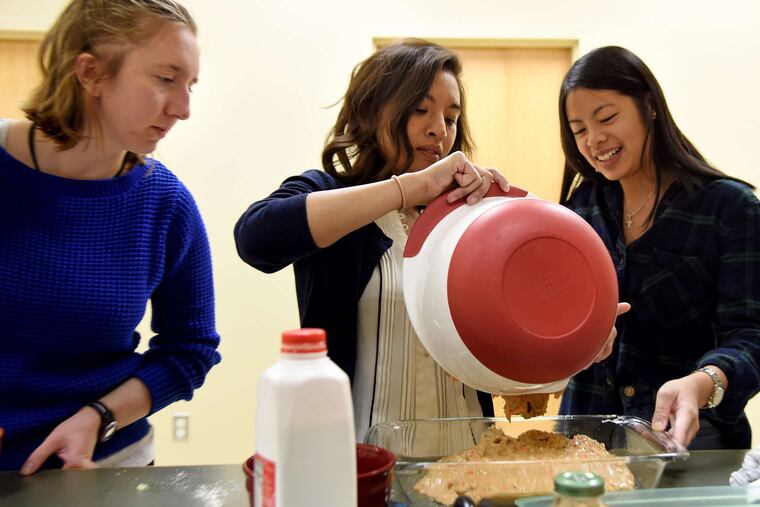For med students, cooking as therapy
For their final cooking class, students in the My Daughter's Kitchen program invite friends and family to dinner, to celebrate and show off the skills they have learned over eight weeks of lessons.

For their final cooking class, students in the My Daughter's Kitchen program invite friends and family to dinner, to celebrate and show off the skills they have learned over eight weeks of lessons.
But the students at the Lewis Katz School of Medicine at Temple University, where I have been teaching, took it one step further. They invited classmates to dinner and put them to work, sharing techniques as they prepared the meal together.
The class at Temple is one of 35 healthful-cooking classes volunteers are teaching this fall at urban schools across the region. It was offered as an elective at the med school, not only to encourage students to cook for themselves, but also to prepare them to discuss healthful eating with their future patients, as so much of modern disease stems from poor diet.
The med students had chosen four dishes to prepare: mushroom Bolognese, rosemary chicken drumsticks, a green salad with lemon vinaigrette, and a carrot cake for dessert. So there was plenty to do.
Hilario Yankey, who aspires to be a surgeon, immediately sized up the situation and took charge. Four recipes, 11 students, and soon he was handing out printed recipes to his classmates, taking on the most labor-intensive dish, the mushroom Bolognese. But he did not hesitate to assign tasks to his own guests - his girlfriend, Allie Hess, and his classmate Stephan Castro.
The other future docs did the same, and soon the kitchen was humming with action, with med students grating carrots, chopping onions and mushrooms for the Bolognese, juicing the lemon for the vinaigrette, chopping rosemary and garlic for the chicken marinade, and cracking eggs and measuring ingredients for the carrot cake.
"This must be what it is like to work in a restaurant kitchen," I said, looking around, "with all these sous-chefs to help with prep."
"I might have to think about switching my career," joked Hilario, "so I can have all these people to boss around."
"Let's be honest, Hilario," said Stephan. "You will be the boss whatever you do."
"C'mon, really?" Hilario said, feigning disbelief as he worked through two pounds of mushrooms, chopping with impressive precision, skill, and speed.
"We have Morimoto down here - the Iron Chef," said Stephan, referring in mock admiration to his friend.
Hilario looked at his friend, then at his friend's onions. The recipe called for the onions to be chopped fine.
"Fine?" Hilario challenged with the authority of the master chef. "That's not fine."
Stephan defended himself. "It's going to cook down. It doesn't matter."
"It does matter for the Bolognese," said Hilario. Stephan began chopping the onions much finer.
As the students cooked, they all talked about their favorite restaurants in town, and one guest, Ben Matais, who is French (and who had naturally impeccable pronunciation of Gruyere cheese, but who struggled with some medical terms, especially menopause), had a surprising choice: the wings at McGillin's Olde Ale House.
"Not exactly haute cuisine," I joked.
But the others quickly agreed, especially on Tuesday nights, when they are 25 cents a wing.
"That's 30 wings for $7.50," calculated David.
Despite their love of cheap bar food, these students were clearly aware of how much proper diet influences health.
"Nutritional health is one of the reasons I wanted to be a doctor," said another guest, Spencer McCaffrey, who is thinking about specializing in family medicine. "I love food, and I'm more and more upset by the food industry. I think it is not talked about enough."
In the end, the recipes all came together beautifully: The carrot cake was out of the oven to cool; the salad was tossed with the vinaigrette and ready to serve; the pasta was mixed with the mushroom Bolognese, with Parmesan cheese grated to sprinkle on top. David Pioquinto was checking the temperature of the chicken with a meat thermometer.
Khea Tan filled her plate with a drumstick, pasta, and salad, and it looked so good, she stopped and took a photo to Snapchat her friends, who opted to study for a big physiology exam Monday instead of coming to dinner. "They ditched me, and I want them to see what they missed," she said. Then she felt bad and added another message: "I hope you got a lot of studying in."
The room had been buzzing with conversation and laughter all evening. Suddenly, it was silent, as the hungry medical students dug into the dinner they had prepared.
They all raved about the simple food, and the students who had taken the class for eight weeks all expressed gratitude for the experience.
"I really learned a lot," David said. "But most of all, I loved the total break from all the stress of med school. You have no idea how important that is."
"I hope that you will find cooking to be like that for the rest of your lives," I told them all. "Instead of a chore, I hope you will see it as relaxing, as a break from the stress of life, as a simple way to take care of yourself."
215-854-5744